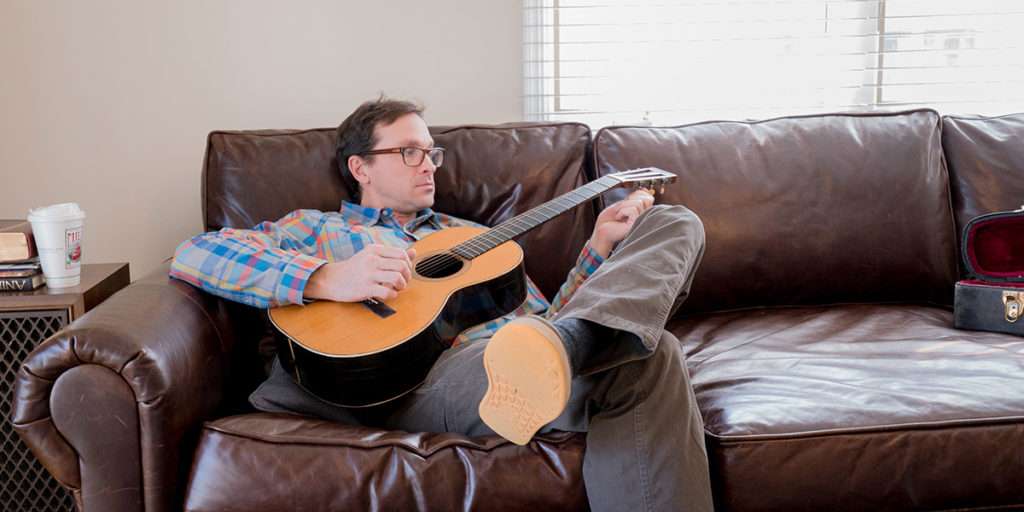
Managing over 200 apartments means that late night phone calls are just part of the job.
There are the usual stories – of good folks paying their rent and friendships that form. And then there are other sorts of tales – of the electricity going out in an apartment because of vandalism or a tenant whose mugshot happens to make the papers.
Fortunately, these are the more unusual situations in residential property management, but Case Maranville recognizes that with each new tenant, there is always an element of risk.
Case has worn many hats over the years, and each venture has had elements of uncertainty. He has been a musician of a nationally known band, has a degree in wildlife management, is an entrepreneur, an audio engineer, and currently co-owns a residential property business with his brother.
Despite the variety of his experiences, each situation has helped inform Case’s perspective and has pushed him to continue to take paths that occasionally involve risk.
Before his property management days, Case played bass and toured with a band he helped form called Vota.
While in the music industry, he and his bandmates understood they couldn’t sit around and wait to be discovered – they had to create their art while simultaneously figuring out how to make it profitable. By devoting themselves to their craft and forging partnerships and connections within the music industry, they were able to tour and perform in front of thousands of people.
“I learned a lot about working within a partnership and learned about self-determination. Those lessons help me now in the business I run with my brother Cole.”
In 2006, Case began to realize that he needed to begin considering a career move when his wife Lindsey gave birth to their first son River. While the band had been a great fit before kids, it soon became apparent that touring and having a family wouldn’t remain sustainable.
Case left the band and he and Lindsey decided to move from their farm just west of Lincoln and into a house in the heart of the city.
“This was in 2008, just before the housing market crashed, so the banks looked at our credit and didn’t think twice about letting us take out a second mortgage. We rented out the farm and I quickly started learning what it meant to be a landlord.”
While he and his family settled into their life in Lincoln, Case found a job working as an audio engineer for a large church in west Omaha. This job provided him with a good baseline income, the ability to use his expertise in sound and music and the flexibility to slowly begin exercising his entrepreneurial mind.
One day, Case’s brother Cole called him up to propose a business idea. He had been reading books about investments and thinking about rental property in Lincoln and in the meantime had found an intriguing opportunity in the form of a duplex for sale near downtown Lincoln.
Neither brother had any idea that this initial purchase would take them to the place they are today, with 236 residential units in 37 buildings throughout the Near South neighborhood.
“We now offer a variety of options. We have a lot of tenants aged 20-30 looking for the interesting old converted houses near downtown. We also have people with fixed incomes and those who need subsidized housing.”
Case said that his work has become a really good fit for his personality.
The job requires him to be a “finder” – one of his favorite things to do – of the right properties to buy and the right tenants to fill those spaces. He likes that he gets the opportunity to provide good housing situations for all different kinds of needs and strives to provide fair, good service for his tenants.
He also finds his interpersonal and problem-solving skills being put to use. From lease agreements to conflict resolution, Case finds that forthright, respectful communication is key to maintaining good tenant-landlord relationships.
“I’ve learned a lot about people in the last eight years. Property management is 50% about the buildings and 50% about humanity.”
Case appreciates the opportunity to work alongside his brother and to be invested in the work together, recognizing that they both bring important things to the table.
One of the elements Case most appreciates about his work is the opportunity for both freedom and control, something that has slowly come as the business has developed.
“Owning your own business is a 24/7 thing. It’s just the way it is. There are eventual perks though – being able to control your own schedule. I want to work hard, but not be a slave to the job. I will work hard for those ends.
“For now, music is on hold and that’s ok. That’s how it’s supposed to be. We still have music around the house. Even the 19-month-old will get on the mike when we’re all hanging out down in the basement. You have to remember that just because things are on hold doesn’t mean it’s over. The things you love will come back around.”
Every business story or idea Case speaks of is laced with a thoughtful approach. He is not simply a straightforward engineer or businessman, nor is he an artist who can’t figure out what he’s about. His self-determination is evident and the ease with which he moves speaks to an inner confidence and peace.
Case isn’t on a crusade, but seems to intuitively understand that the risky things in life are sometimes the most valuable. He works hard to make sure he remains engaged creatively and thoughtfully as he serves the people within his sphere of influence.